Detailed Summary: Waiting for the Rain | Chapter Notes For Class 8 PDF Download
| Table of contents |

|
| About the Author |

|
| Key Points of the Story |

|
| Detailed Summary |

|
| Theme |

|
| Message |

|
| Difficult Words |

|
About the Author
Kamakshi Balasubramanian is a respected Indian author, teacher, and environmental thinker. She has a deep love for storytelling that inspires readers to see the world with more care and understanding. Her writing often focuses on nature, everyday life, and simple truths we tend to forget. Through her thoughtful and gentle stories, she encourages young readers to notice the beauty in small things and to value the bond between humans and the natural world. In "Waiting for the Rain", she uses the voice of an old woman to remind us that, just like people, even the land needs time to rest and recover.
Key Points of the Story
- Velu is a hardworking farmer who wakes up early every day, hoping for rain.
- This year, there has been no rain, which is unusual. Velu and his neighbours are worried about their crops.
- They wait for weeks and months, but the rain does not come. The fields become dry and cracked.
- Velu thinks about going to astrologers for help, but he does not believe they can bring rain.
- He visits the weather office, but the people there also do not know when it will rain.
- Feeling tired and thirsty, Velu sits under a tree and meets an old woman who is also resting.
- The old woman smiles at Velu, but they both feel sad because of the lack of rain.
- Velu expresses his frustration about not being able to work on his land due to the drought.
- The old woman tells Velu that sometimes the land needs to rest, just like people do.
- She explains that nature takes care of everything and that the earth has its cycle.
- Velu begins to understand that the land might be resting and that rain will eventually come.
- As Velu walks home, he feels a breeze and sees clouds forming in the sky.
- He becomes excited as he realises that rain may soon fall, bringing hope for his crops.
- Velu runs home, feeling happy and hopeful about the future.
Detailed Summary
Velu was a sincere and hardworking farmer who lived in a village. Every day, he woke up early to tend his land. He loved his work and never took a break, even during festivals or holidays. For the past six years, his land had always yielded good crops like jowar and dal, which made him proud and hopeful.
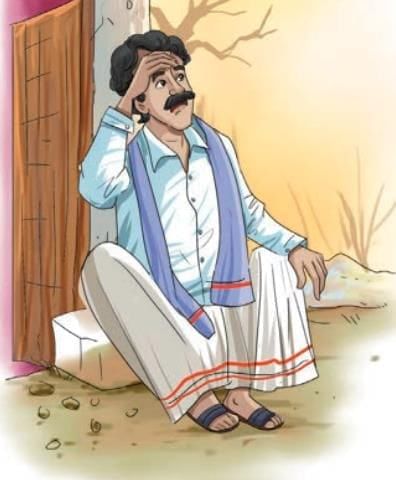
One morning, Velu woke up hoping it would rain. He looked at the sky, but there were no clouds, only a bright red sun rising. Without rain, Velu couldn’t plough his field, leaving him worried and helpless. This year, the usual monsoon rains had not come. The earth in the fields had dried up, cracked, and turned lifeless. Farmers like Velu, who depended on rain, had no choice but to wait and hope.
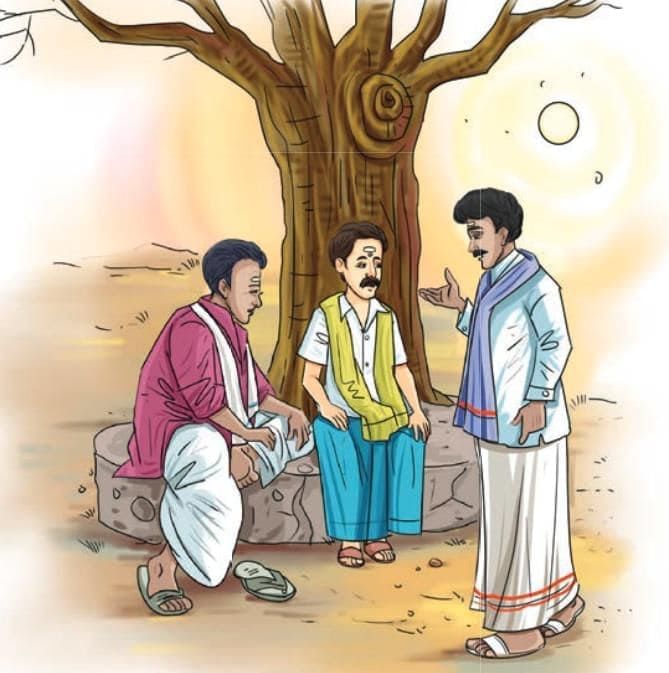
Some villagers began to lose patience and suggested visiting astrologers to perform rituals or give advice to please the heavens. But Velu didn’t believe in these ideas. He trusted science and nature more. So, he went to the city to talk to experts at the weather office. Sadly, even they were confused. They told him the weather conditions seemed right, but the rain still hadn’t come. Velu returned to his village feeling tired, dusty, and discouraged.
On the way back, Velu stopped under a shady tree to rest. There, he noticed an old woman already sitting under the tree. She had a kind face, sparkling eyes, and a warm smile. Velu was curious and began speaking with her. He shared his sadness and frustration, telling her how much he had worked over the years and how the drought was threatening his family’s survival.
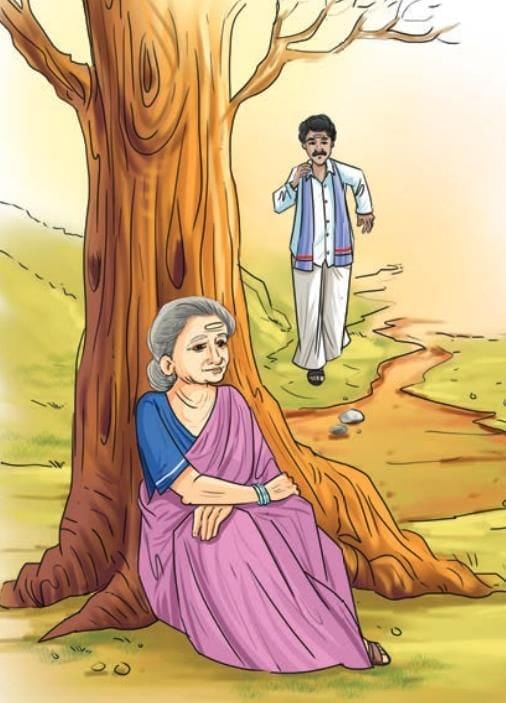
To Velu’s surprise, the old woman gently suggested that perhaps the land itself was tired. She explained that, just like people, the earth also needs time to rest and recover. She reminded him the soil had been worked for thousands of years and that nature often brings a pause so everything can regain strength. Her words made Velu stop and think. He realised this long dry season might be nature’s way of giving the land a break.
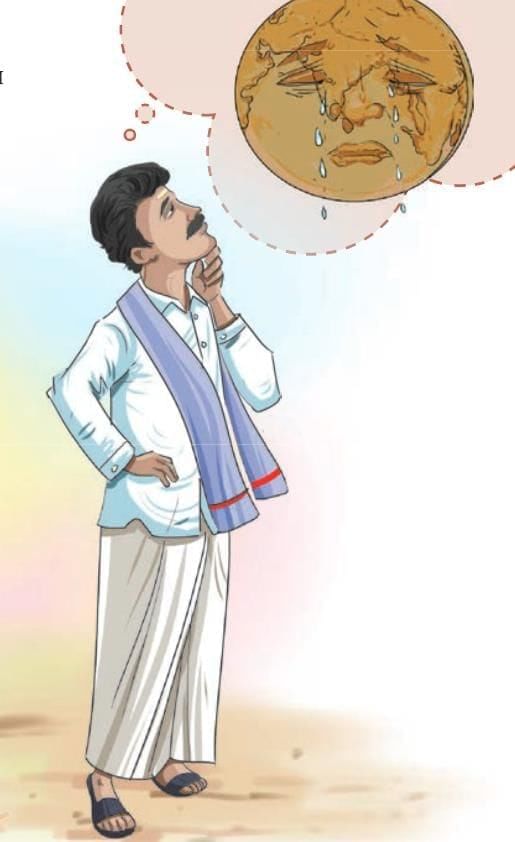
As Velu walked home, he thought deeply about what the old woman had said. The idea that the earth could be resting gave him peace. He began to feel hopeful again. Just then, he felt a cool breeze and a tiny drop of water on his shoulder. Looking up, he saw clouds gathering in the sky. The air grew cooler, the light dimmed, and soon it seemed the rains would finally arrive.
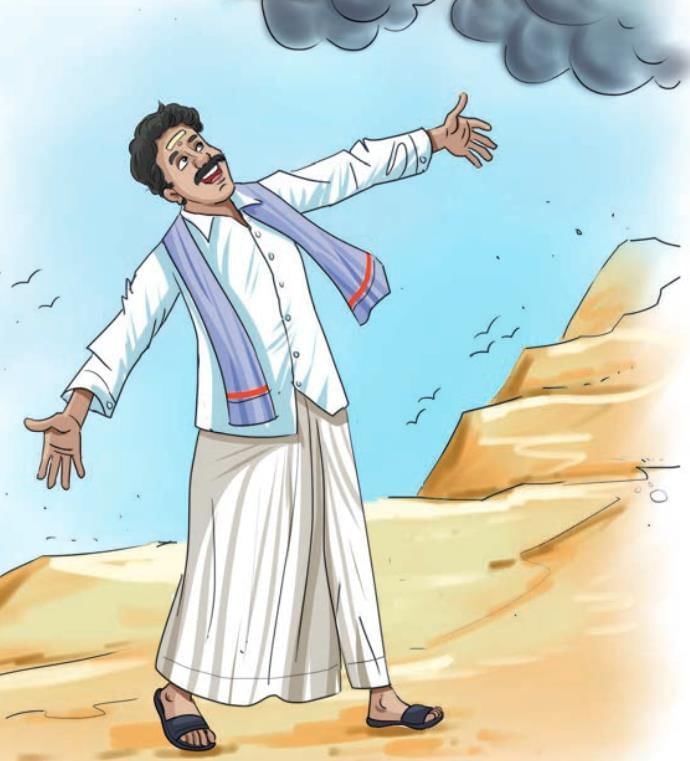
Velu was filled with happiness. He understood everything in nature happens for a reason and at the right time. Trusting nature, he ran home joyfully, ready to start again with a fresh heart.
Theme
- The story highlights the connection between humans and nature, showing how farmers depend on rainfall and natural cycles.
- It emphasizes patience, balance, and renewal, teaching that both people and the land need time to rest and recover.
- Through Velu’s experience, it conveys hope and trust in nature’s rhythm.
Message
- The story teaches that hard work must go hand in hand with respect for nature’s timing.
- It reminds us that every pause or difficulty has a purpose, and patience brings reward.
- By listening to the old woman’s wisdom, Velu learns that everything in life follows a natural cycle and that we must accept it with faith and gratitude.
Difficult Words
- Crimson: A deep red colour.
- Encouraging: Giving hope or confidence.
- Dejected: Feeling sad and disappointed.
- Astrologers: People who study the stars and planets to predict the future.
- Wrinkled: Having lines or folds in the skin, usually due to age.
- Fragrant: Having a pleasant smell.
- Undisturbed: Not being interrupted or disturbed.
- Jowar: A type of grain used for food, similar to sorghum.
- Harvesting: Gathering crops when they are ready to be eaten.
- Cracked: Having lines or breaks on the surface.
- Frustration: A feeling of being upset or annoyed because you cannot do something.
- Rejuvenate: To make something feel young or fresh again.
FAQs on Detailed Summary: Waiting for the Rain - Chapter Notes For Class 8
| 1. What is the main theme of "Waiting for the Rain"? |  |
| 2. Who is the author of "Waiting for the Rain" and what background does he have? |  |
| 3. Can you provide a detailed summary of "Waiting for the Rain"? |  |
| 4. What message does "Waiting for the Rain" convey regarding nature and agriculture? |  |
| 5. What difficult words are used in "Waiting for the Rain" and what do they mean? |  |















